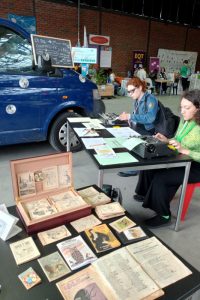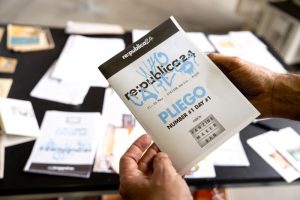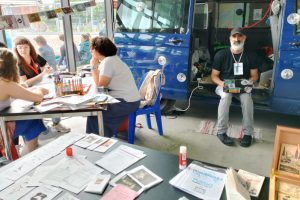This post is also available in: Español (Spanish) English

L’equip de PliegOS ha participat enguany al festival re:publica a Berlín amb una proposta de co-creació de fanzines. Aquesta n’és la crònica.
Corren temps estranys, en què qualsevol text o imatge pot ser sospitosament perfecte i encaixar a la mida desitjada en el lloc i moment adequats, gràcies a la “intel·ligència” sintètica d’eines com ChatGTP i similars. Paràsits estadístics ultraràpids, d’eficiència imbatible, sobrealimentats amb tot el contingut cultural del passat i del present que hem anat digitalitzant. Des de Wikipedia, des de col·leccions i arxius online, des de cada fòrum i cada diari online i cada blog. Ho expliquen molt bé David M. Berry i James Stockman a l’article (d’accés obert) “Schumacher in the age of generative AI: Towards a new critique of technology“, on proposen el concepte de noves “patologies del coneixement” derivades de l’ús i l’abús de la IA. Allí citen el que argumenta l’artista Annie Dorsen: com aquestes eines “representen la captura corporativa total de la imaginació, la part més íntima i impredictible de la ment humana.”
Per a Dorsen, al seu torn, la denominada IA generativa no suposa tant un perill o amenaça per als artistes, que poden continuar amb la llibertat de les tècniques combinatòries (i perdre ràpidament l’interès en quelcom que pren les decisions creatives per si mateix), sinó més aviat per a la resta de la societat, quan recorrem rutinàriament a aquests nous serveis (en centres de dades cada vegada més assedegats d’aigua) a l’hora de crear, de produir, d’imaginar. I llavors es (re)genera normalment allò previsible, uniforme, banal. I és quelcom que està succeint (ja, ara mateix) a una escala i velocitat que fa témer, com reflexiona Andrew Perfors entorn dels processos creatius, pel col·lapse mateix dels significats, l’artificialitat de l’aprenentatge, la abansala dels autoritarismes.

Des de la constel·lació d’activismes culturals i voluntats lletraferides del projecte pliegOS.net (part de la família cooperativa femProcomuns) portem anys subscrivint, col·laborant i promovent la romàntica idea que el paper no només ho aguanta tot, sinó que els fulls impresos (els llibrets en aquest cas, la literatura de cordill, els fanzins, etc.) són i seran el millor suport per fer de l’escriptura i la lectura una cosa novament autèntica i divertida, en aquesta època liminal de disbauxa digital.
Perquè està demostrat empíricament que llegir en paper és més immersiu i enriquidor que fer-ho en pantalla, així com les qualitats tàctils úniques d’escriure a mà o amb màquina d’escriure, en una antiga i fèrtil connexió síncrona amb la nostra ment. Així que seguint amb les ganes de publicar i d’experimentar, i de desenvolupar eines obertes útils per a aquest propòsit, tres de nosaltres ens vam embarcar fa uns dies en una furgoneta-impressora de fanzins estil “chapbook” per participar en el festival re:publica 2024 de Berlín, una conferència que des de 2007 aborda temes clau de política, mitjans i societat digital.
La nostra proposta de co-creació participativa (“Chapbooks against the Machine >> On spot co-created zines”) està inspirada en experiències prèvies en què acomodem la producció editorial “do-it-yourself” o “fes-t’ho tu mateix” a l’espai públic i al format de fira, atraient la gent que passa i sent curiositat per “allò retro” i analògic i tangible. El que es pot tocar amb les mans, el que es pot escriure i imprimir al moment. Per a això vam plantar dues màquines d’escriure Olivetti en una taula, incitant a l’escriptura automàtica, i en una altra tot allò necessari per fer collages i il·lustracions sobre paper amb diferents tècniques. En una tercera taula, com una mena d’esquers de paper, exemplars d’una col·lecció d’antigues revistes de Patufet, al costat de mostres de l’àmplia producció de plecs de literatura diversa que portem a coll (de còpies digitals que atresorem amb afecte): contes il·lustrats per nens, manuals pràctics, blogposts en paper, diaris de camp, llibrets-postal i un llarg assortiment de les nostres experimentacions fanzineres fins avui dia, entre allò actual i allò clàssic.

L’objectiu principal (aconseguit!) era que cadascun dels tres dies de re:publica poguéssim recopilar contribucions de persones que s’acostessin fins al nostre peculiar “estand”. Decidint el tema sobre la marxa a l’inici de cada jornada, d’aquesta manera, el primer dia vam produir amb més gent un fanzin-pliego que seguia el lema d’aquest any (“I care about… / I don’t care about…”); el segon dia vam recopilar reaccions a les possibilitats i les amenaces de la IA en la producció musical (que pel volum d’aportacions va implicar publicar un número doble); i finalment el tercer i últim dia, sobre el conflicte (o millor dit la guerra) a Palestina, tan presents massacres com les de Rafah (un tema com diluït, incòmode en l’ambient del festival).
Buscant així veus anònimes (la majoria), ganes de compartir (contagioses) i d’escriure a veure què tal (ni tan mal), vam aconseguir no només tres “sprints” editorials per armar i difondre al moment els corresponents fanzins, sinó el nostre (segon) objectiu d’activar més converses i contactes interessats en les possibilitats del nostre laboratori mòbil de lecto-escriptura situada (el relat de viatge també té el seu propi pliego, es clar) Gent que passava, s’interessava, participava i l’endemà portava a més gent, en un boca-orella sobre uns tipus hiperactius (ho vam donar tot!) en una furgo-impressora per escriure i publicar al moment des d’un racó remot de la conferència.

Però potser el que més destacaria d’aquesta nova iteració experimental del projecte pliegOS, envoltades com estàvem d’infinitat de gurús, xerrades i projectes “hype” (sobre la darrera tecnologia digital, les possibilitats de la IA per a això i per a allò, noves eines i apps, etc.; encara que també hi havia moltes perspectives crítiques i racons per a l’artivisme de codi obert, cultures d’economia solidària, voluntariat social), va ser comprovar de primera mà l’atracció renovada de, per i cap a allò analògic. Allò imperfecte, allò autèntic. La fascinació i complicitat cap a el que es pot escriure i llegir “en local”, com si es tractés d’un divertiment d’ofuscació per passar sota els radars extractivistes que ho estan regurgitant tot en servidors remots.
Això sí, vam pecar d’ambició i ens va quedar al tinter dur a terme un parell d’experiments per editar la transcripció automàtica d’àudio (des d’un ordinador no connectat a la xarxa), i diverses millores i avanços en el codi fantasmal-script que batega sota la Pliego-Maker (aquí un resum del seu estat de desenvolupament actual). També tenim pendent experimentar més amb el format per enviar pliegos frescos per correu postal (aquesta infraestructura de comunicació tan pausada com infrautilitzada). Per sort, per a això i alguna cosa més, en breu tindrem una altra oportunitat en una nova estació-impressora a finals de juliol, durant el congrés EASA a Barcelona (Doing and Undoing with Anthropology). Ah, i uns dies abans contribuint per aprendre al costat de més gent fanzinera i experimentadora en l’aventura “La ciutat de les ombres – Etnografiar l’habitabilitat urbana en temps de mutació climàtica“.
femProcomuns impulsa i dona suport al projecte PliegOS.net, en el qual hi ha implicades persones sòcies de la cooperativa i altres participants, entusiastes de l’autoedició, la creació col·lectiva i l’empoderament a través de l’apropiació dels mitjans de comunicació.
Vegeu també
- Podcast TICaMica: PliegOS, canya i cordill
- PlegaVeu: Recital de poemes amb transcripció de veu i producció d’un llibret a l’Espai Òmnium de Manresa
- PliegO’Maker al congrés ATypI
